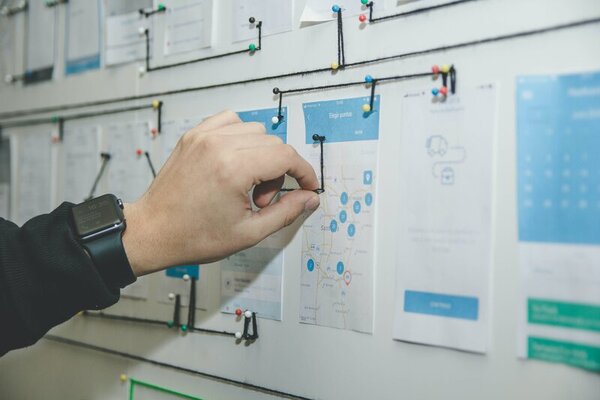Art, Audio, Animation, Code, Design, Engineering, Narrative and QA are just some of the many development teams working together to create a game.
The overall product is the sum of all of their parts and so each department has their individual tasks and milestones that must be reached during the game’s production.
One team failing to meet a deadline might not sound like a big deal, but it can create a ripple effect that spreads across departments, resulting in missing features and further delays.
Luckily, producers and project managers oversee the development of individual aspects of the game as well as the overall product to ensure that this doesn’t happen - they keep tasks on track and production flowing.
This allows the content creation teams to focus on what they do best by not having to spend significant amounts of time planning and managing their dependencies and milestones.

What Kind of Person is Suited to a Games Production Role?
People from a variety of backgrounds and walks of life can be well suited to a production role in the games industry.
We spoke to two members of our Production Team: Lead Project Manager, Lee Heir and Senior Producer, Max de Vries to hear their thoughts on what type of person makes a great PM or Producer and how to get started.
What Type of Personality and Skills Do You Need?
You might think being super organised is the most important personality trait of a producer or PM. However, there’s a lot of other key characteristics and skills that are crucial to these roles.
Approachability - You have to communicate with a lot of people in a production role, so you need be someone that anyone on a development team is comfortable coming to with any issue be it big or small.
Listening skills – To gauge how long a task may take, what’s involved in the creation of a game from all areas or to understand any potential blockers standing in a team’s way, you need to be willing and able to listen to and understand a lot of different information.
We recommend researching active listening and its three As: Attitude, Attention and Adjustment.
Understanding different personalities – A development team is made up of many different personalities and so a single approach to communication will not be received in the same way by every individual on the team.
You need to be able to adapt your message and approach accordingly to ensure clear and effective communication for everyone.
Being prepared for anything – No day is ever the same as a PM or producer, there’s always a new unseen obstacle to overcome, which can range from very simple to completely off the wall requests.
It’s therefore crucial you keep an open mind and prepare yourself to work on a variety of tasks both foreseeable and unforeseeable.
‘At the very beginning of my career, I was told that “If nobody is aware of what you are doing as a PM, then you are probably doing your job right”.
‘This is to say, if things are running smoothly and you are not out there front and centre screaming for answers, things are going ok.’ – Lee Heir, Lead Project Manager at Deep Silver Dambuster Studios.
Organisation – In game development, there’s always a lot of different tasks and areas that need looking at each day. You should be able to prioritise and manage your own time as well as other peoples to tackle them in the most productive way possible.
Patience – Things aren’t always smooth sailing in game development. You need to have patience and good humour if things go off track and the ability to keep a level head to get them headed back in the right direction.
Diligence – There’s a lot of things that need actioning as a member of the Production Team. From verbal requests to meeting action points, you need to be constantly following up and committed to finding resolutions where needed.
The ability to speak up – It’s part of the job to assess the success of different aspects of the game’s production and report back to those in charge. This means being honest about what has and hasn’t worked.
‘The hardest part of being a producer for many people, is talking truth to power.’ – Max de Vries, Senior Producer at Deep Silver Dambuster Studios
An interest in all aspects of game development – A game development team is made up of many creative and talented people who are excellent at what they do. The work they have the ability to produce should genuinely interest you and you should be excited to be a part of it!

What Things Do You Need to Learn?
To be effective in a games production role, you need to be clued up on the most efficient ways to work.
Development methodologies - Agile and Waterfall development are both used for different aspects of game development, you should be familiar with the philosophy and usage of both.
‘Learn traditional Waterfall project management before Agile, as Agile was a reaction to what came before it.’ – Max de Vries, Senior Producer at Deep Silver Dambuster Studios
Project management software such as Hansoft/JIRA/Trello – Though similar on the surface, different software can work better for different teams, you should be familiar with as many as possible to understand their ins, outs, pros and cons.
How Can You Get Started in Games Production?
As games production roles are suited to a range of people, there’s naturally a lot of different routes into them.
Education – Several University courses offer specific modules in game production and project management. By taking one of these courses, through various modules, you can gain an understanding of many aspects of game development as well as games production.
Quality Assurance – A lot of producers and project managers start their careers working in QA before shifting into a production role.
‘QA is a great route into the industry as it allows you to see and interface with all areas of a game. You also gain a great appreciation for the work that goes into creating a game and spotting bugs shows a good eye for detail in your daily work.’ – Lee Heir, Lead Project Manager at Deep Silver Dambuster Studios
Other routes – Getting expertise as a project manager outside of the games industry or working within games in any other discipline can also make you a good candidate for a games production role.
‘I have known audio engineers, programmers, artists, animators, localisation managers and designers be good producers.’ – Max de Vries, Senior Producer at Deep Silver Dambuster Studios.
Any Questions? Just Ask!
We hope that you have found this blog useful and as always, if you have any questions, reach out to us and we will endeavour to get back to you.
Be sure to also check our careers section regularly for games production roles and other relevant vacancies.




